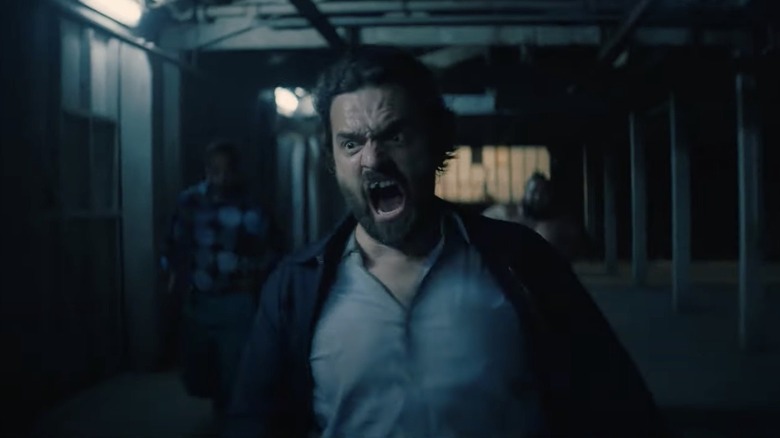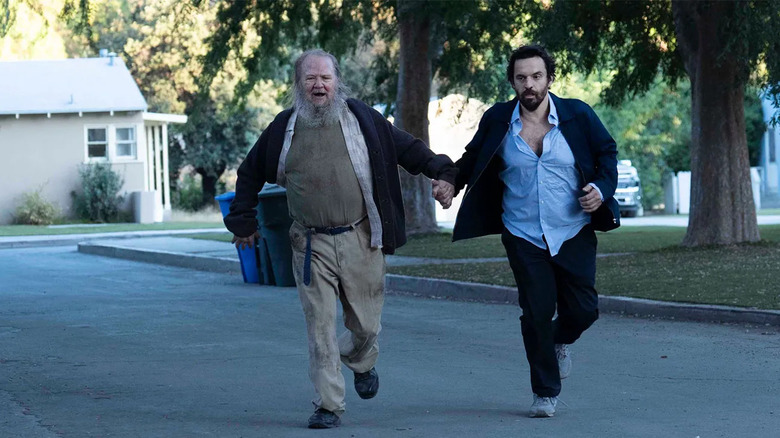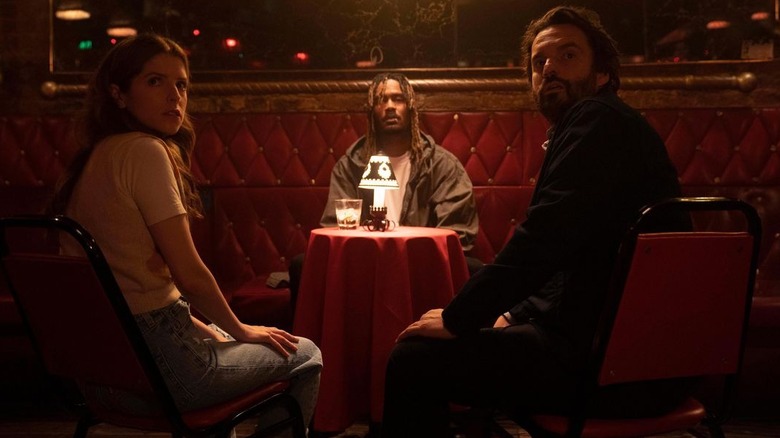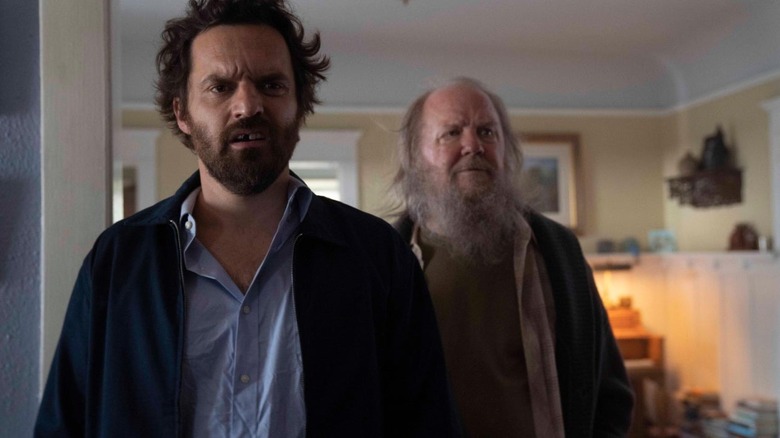The Most Confusing Moments In Jake Johnson's Self Reliance Explained
The rules are simple: Survive 30 days while being hunted by people attempting to kill you, and win one million dollars. As long as you're with another person, the hunters will leave you alone. This is the proposition presented to Tommy Walcott by a paid-to-be-there Andy Samberg in the Hulu film "Self Reliance." Written, directed, produced, and starring Jake Johnson, "Self Reliance" taps into the thrilling anticipation of David Fincher's "The Game," but with a lighthearted sense of humor and hell of a lot of heart that could only come from the guy who gave us Nick Miller on "New Girl" and one of the best episodes of "Mythic Quest."
Tommy decides to exploit the loophole by paying a transient man named James/Walter (Biff Wiff) to stay with him 24/7. He also encounters a woman named Maddy (Anna Kendrick) who is also playing the game, and who Tommy starts to develop feelings for — a first since his ex-girlfriend broke up with him two years ago. The game seems too good to be true, but after days of isolation with Maddy, Tommy is in this for the long haul. It's only when a mysterious man named Charlie (GaTa) informs them that the game is part of a reality show called "Delusions of Grandeur" where they are being set up as a joke that Maddy decides to bail, and things seem like they're falling apart.
Tommy continues with the game, James/Walter by his side, dealing with a team of production assistant ninjas led by Eduardo Franco ("Stranger Things"), a variety of different hunters, and some motivational wisdom from Wayne Brady. "Self Reliance" is a fast-moving comedy thriller, but some viewers might have walked away feeling confused about the game and whether or not it was real or just something Tommy made up in his mind. Luckily, I'm here to help guide you through it.
Spoilers follow.
Does Tommy win the game?
After days of chaos, Tommy gets a visit from the PA ninja while alone in a homeless camp, who gives him the advice to move to a different location because he's depressing the audience and the show needs a more exciting ending, but that if he "finds a limo," he'll be transported to the grand finale. He ends up following a woman to a bus stop and comes across a hunter in a cowboy hat, who explains that the game has been personalized to him the whole time, which explains why there were so many random references to his likes and dislikes. He eventually finds the limo with Andy Samberg inside yet again, who lets him know he can either quit now and go home safely, or see it through to the end. Tommy believes he's in too deep, and is taken to a warehouse for the final challenge.
Tommy arrives and is chased by a sumo wrestler, a man dressed as Sinbad (the comedian, not the fabled sea adventurer), and a Samurai. The trio chases him into what appears to be an empty room until the lights turn on and everyone Tommy has encountered during the game appears. He's won the grand prize. He tries to tell his family after the fact who still don't seem to believe him. He asks Walter if he wants to be his new roommate, and Tommy decides to show up on Maddy's doorstep before the film cuts to black. It certainly seems like the game is real and Tommy really did win the grand prize, but given his family's hesitancy and the fact we don't see Maddy open the door when he shows up, how can we be so sure?
Is the game real?
In an interview with Decider, Johnson confirmed that the game was very much real, but that he initially wanted the ending to feel a bit more ambiguous. "It's probably just my lack of experience, but for me — and I know this seems naive — but it's choose your own adventure," he explained. "The ending doesn't matter." However, when test audiences first saw the flick, there were constant debates about how the film ended and whether or not the game was real or just in his head. "The ending of this movie really changes the viewing experience in a way that I didn't expect," Johnson said. "For audiences, those last 10 minutes really matter."
Johnson went through a few versions of the ending before settling on what ultimately wound up in the movie. It was actually Andy Samberg, who produced the film under his Lonely Islands banner and cameos in the film as himself, that encouraged Johnson to crystalize the ending. "It should end in a very clean way, that's understandable," said Johnson. "He pushed for it to end in this order. Then we put it in front of audiences, and a lot of them agreed."
So the game is real, Tommy's life really was in danger, and he is now on a staggered payment plan of 250 monthly (aka 21 yearly) installments of 4,000 Greenlandic krone, or $636. The celebrities who appeared were all in on the game, as were the ninjas sneaking around his house. Honestly, the gameshow sounds a lot like one of the games the rich weirdos in "Rat Race" would have played for fun.
Does the game double as a metaphor?
Despite Johnson's insistence that the game in the film is very real, there are still plenty who think the game is something he made up in his head. After all, even after winning, his family still doesn't believe him when he talks about the experience. Johnson explained that regardless of what the film says, the audience can interpret it however they like, because accessing art can be a personal experience. As he said:
"Look, here's what I really believe. I might not be the majority, but when I consume something, it's f***ing mine. My interpretation is right. For example, I loved 'The Sopranos.' I don't care what David Chase says about the ending, because when I watch it alone, my ending is the right answer. Maybe that's because I'm an egomaniac, but it belongs to me ... For a long time in press, I was like, 'I don't want to say my take on it, because who cares?' But to me — and mind you, I'm the guy playing Tommy — I have to play it like it is real. I had to shoot those scenes like they are real."
It is fascinating that Johnson threw in the little reminder at the end that in addition to writing and directing, he was also starring in the film ... meaning he would also have to also approach the project from the character of Tommy's perspective. Is the game real because Tommy needs it to be real, or is it actually real because Johnson says so as the author? "The truth of the matter is, if you want to believe it's not real, there's enough to believe that it's not real," said Johnson. Perhaps the true meaning of the film exists in the title — to figure it out, you'll have to rely on yourself.



